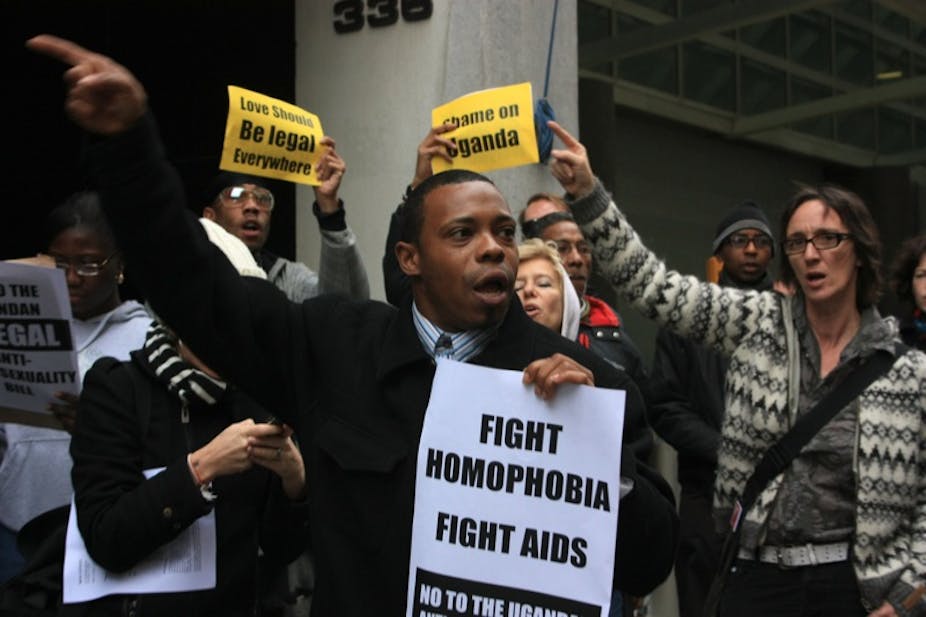The UN is mandated to protect all people without discrimination, to advance equality and to protect the human rights of all individuals. It has a strong track record of putting those things into place where it comes to gender, race, religion, ethnicity, age and nationality.
There are treaties, committees, monitoring bodies and other mechanisms in place for women, racial and religious minorities, indigenous populations, children and the elderly, and migrants, among others. Those mechanisms work with varying degrees of success in different states, but they send a strong message to all countries, loud and clear: the UN will not condone nor tolerate discrimination on any grounds.
Well, almost any grounds.
The UN still does not protect sexual orientation or gender identity minorities. Despite the clear vulnerability of people in those categories, there is no specific treaty for LGBT people; there is no committee to monitor the protection and promotion of their rights and there are no intergovernmental working groups, resolutions or declarations. Instead, there is silence.
But even worse, an ominous drum beat is disturbing that silence.
Face of the world
This year, the UN General Assembly elected as its president Sam Kutesa, who was the foreign affairs minister of Uganda at the time that his country implemented its widely denounced and brutal law, originally written to impose the death penalty for “aggravated homosexuality”.
Dubbed the “kill the gays” law by the Western media, the law was passed without its death penalty provisions in February 2014, but then declared unlawful in August. Even with the law now off the books, Uganda still penalises people in same-sex couples with prison terms of up to 14 years.
Uganda is of course not alone in doing this; indeed, more than 70 states across the world have similar laws. But the election of Kutesa so soon after the global condemnation of Uganda’s oppressive and retrograde law sends a chilling message to tens of millions of individuals worldwide.
The General Assembly is the sole UN body where all member states have a seat and a vote, and what happens there sends a loud and clear message about the prevailing opinions of countries across the world. The president of the General Assembly holds the position for a full year and is guaranteed a seat at the table with the most powerful players in the international community.
In Kutesa’s case, that has set up a long year of PR embarrassments for the UN’s less conservative majority. Photographs of Kutesa’s formal meeting with Barack Obama were criticised around the world for legitimising and giving credibility to a man who represents the continued repression and subjugation of minorities.
But this was only the beginning: until the Assembly elects a new president in September 2015, when the 69th Session draws to a close, Kutesa will be its representative at many such meetings and events to come.
Driving a wedge
Of course, Kutesa’s election did not occur in a vacuum. It is increasingly apparent that discrimination on the grounds of sexual orientation and gender identity is not just overlooked, but actively accepted within large parts of the UN and that those factions who actively support it are working to reinforce their position.
Over the past five years, there has been a strong push-back against advances to protect LGBT people from discrimination, criminalisation and violations of their human rights.
In recent months and years, more and more resolutions on “traditional family values” have been passed by the General Assembly and by the Human Rights Council. The countries behind those resolutions include Russia and many Islamic and African countries, where LGBT people are criminalised simply for being sexual or gender minorities. Their discriminatory practices are fast being legitimised through resolutions and panels cloaked in vague, relativistic “values” doublespeak.
These states are currently violating their international human rights obligations to LGBT people – and they know it. They are baldly trying to pre-emptively protect themselves before those violations start to be policed as they should.
Kutesa’s presidency is just another backwards step in the sorry story of the UN’s slow efforts to protect LGBT people. Sadly, it seems that the UN’s noble aim of protecting all individuals from the abuse of their rights is a long way from being realised.

